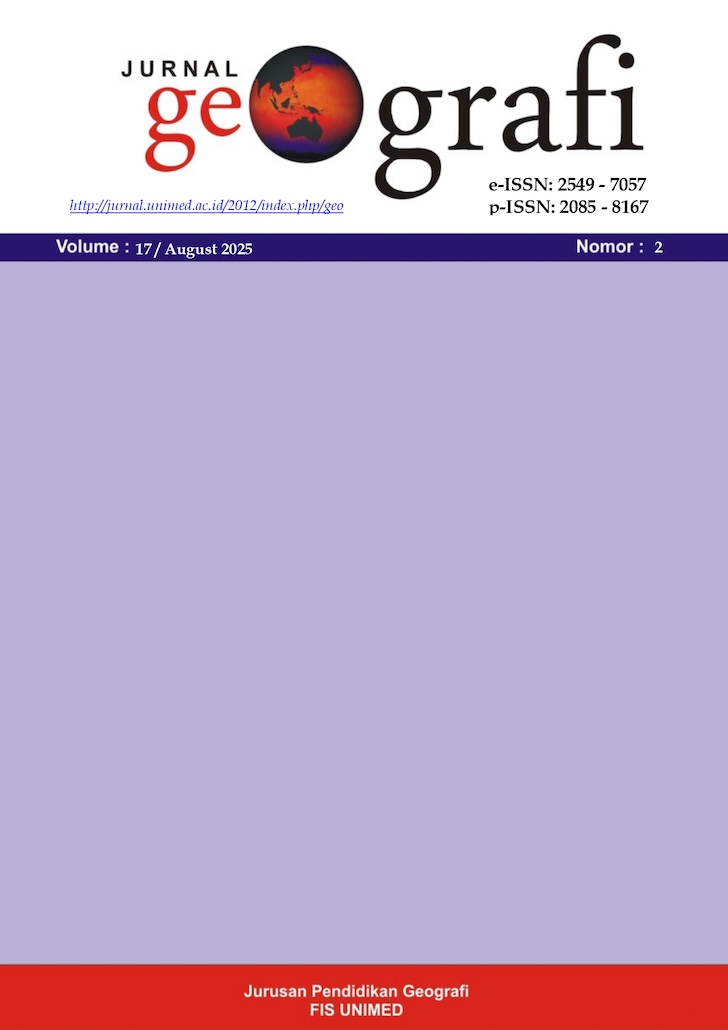Geomorphological Survey and Mapping Practice for Physical Characteristics at Precet Forest Park Study
DOI:
https://doi.org/10.24114/jg.v17i2.67290Keywords:
Geomorphology, Landform Mapping, GIS, Morphometric AnalysisAbstract
Geomorphology is a field of study that focuses on landforms and the natural processes that shape the earth’s surface. The physical characteristics of an area are important for determining land use suitability, environmental management, and disaster risk mitigation, especially in volcanic regions. This study aims to carry out a geomorphological survey and mapping of Precet Forest Park, located on the slopes of Mount Kawi, East Java. The research uses a descriptive quantitative approach by combining field surveys and geospatial data analysis. Primary data were obtained from Total Station measurements, GPS tracking, and observations of land use, landforms, and soil characteristics. Meanwhile, secondary data such as DEMNAS, geological maps, and soil type maps from official sources were used to support the analysis. The morphometric data were processed using interpolation methods including Kriging, Minimum Curvature, and Polynomial techniques through Surfer and QGIS software. The results showed that the study area is dominated by volcanic landforms with Cambisol soils that have a silty clay texture. The topography is characterized by steep to undulating slopes with varying soil permeability and saturation levels, which affect slope stability. Mass movements such as slumps were identified in several locations. The findings of this research are expected to support land use planning and environmental management efforts, as well as serve as a learning reference for geography students in applying geomorphological mapping techniques in the field.References
Aditya, H. F., & Wijayanti, F. (2023). Mengenal Karakteristik dan Jenis Tanah-Tanah Pertanian di Indonesia-Jejak Pustaka. Jejak Pustaka.
Amadia, A. L., Mutmainnah, S. S., Nurhidayati, A., & Amelia, M. G. (2024). Pengaruh Kondisi Geomorfologi Terhadap Penggunaan Sumber Daya Lahan Dan Aktivitas Masyarakat Desa Margaluyu, Kecamatan Pangalengan. CENDEKIA: Jurnal Ilmu Sosial, Bahasa dan Pendidikan, 4(3), 11–16. https://doi.org/10.55606/cendekia.v4i3.2954
Anas, S. (2009). Pengantar statistik pendidikan. Jakarta: Raja Grafindo Persada, 50.
Askoni & Sarminah, S. (2018). Laju infiltrasi dan permeabilitas pada beberapa tutupan lahan di Hutan Pendidikan Fakultas Kehutanan Universitas Mulawarman Samarinda. Ulin–J. Hut. Trop, 2(1), 6–15. http://dx.doi.org/10.32522/ujht.v2i1.1025
Bermana, I. (2006). Klasifikasi Geomorfologi Untuk Pemetaan Geologi Yang Telah Dibakukan. Bulletin of Scientific Contribution, 4. https://doi.org/10.24198/bsc.v4i2.8125
Dibyosaputro, S., & Haryono, E. (2020). Geomorfologi dasar. UGM PRESS.
Dunlop, P., Sacchetti, F., Benetti, S., & O’Cofaigh, C. (2011). Mapping Ireland’s Glaciated Continental Margin Using Marine Geophysical Data. In Developments in Earth Surface Processes (Vol. 15, pp. 339–357). Elsevier. https://doi.org/10.1016/B978-0-444-53446-0.00011-2
E Prasetyo, W., Y Irawan, L., M R Devy, M., & Ditian, D. (2022). Geomorphological Mapping for Land Suitability Evaluation. KnE Social Sciences. https://doi.org/10.18502/kss.v7i16.12172
Febriani, S. (2022). Analisis Deskriptif Standar Deviasi. Jurnal Pendidikan Tambusai, 6. https://doi.org/10.31004/jptam.v6i1.8194
Firmansyah, Y., Khoirullah, N., & Fahrul Yahya, M. (2023). Analysis Of Geomorphological Aspects Of Surade Sub-District, Sukabumi District, West Java. Journal of Geological Sciences and Applied Geology, 7(1). https://doi.org/10.24198/gsag.v7i1.49334
Hartomo, K. D. (2006). Implementasi Metode Interpolasi Linear Untuk Pembesaran Resolusi Citra. Teknoin, 11(3). https://doi.org/10.20885/teknoin.vol11.iss3.art5
Moore, I. D., Grayson, R. B., & Ladson, A. R. (1991). Digital terrain modelling: A review of hydrological, geomorphological, and biological applications. Hydrological Processes, 5(1), 3–30. https://doi.org/10.1002/hyp.3360050103
Pain, C. F., Clarke, J. D. A., & Wong, V. N. L. (2011). Applied Geomorphic Mapping for Land Management in the River Murray Corridor, SE Australia. In Developments in Earth Surface Processes (Vol. 15, pp. 489–505). Elsevier. https://doi.org/10.1016/B978-0-444-53446-0.00019-7
Parry, S. (2011). The Application of Geomorphological Mapping in the Assessment of Landslide Hazard in Hong Kong. In Developments in Earth Surface Processes (Vol. 15, pp. 413–441). Elsevier. https://doi.org/10.1016/B978-0-444-53446-0.00015-X
Prabaningrum, I., Mardiana, A., Gumilar, A., Risky, A. S., Putro, H. R. V., Amalia, R. D., & Ningrum, S. K. (2019). Identifikasi Potensi dan Permasalahan Lahan untuk Arahan Manajemen Lahan (Studi Kasus Penggal Sungai Cemoro Sebagian Kawasan Situs Sangiran). Jurnal Geografi: Media Informasi Pengembangan dan Profesi Kegeografian. http://dx.doi.org/10.15294/jg.v16i2.20885
Priyono, J., Yasin, I., Dahlan, M., & Bustan, B. (2019). Identifikasi Sifat, Ciri, dan Jenis Tanah Utama di Pulau Lombok. Jurnal Sains Teknologi & Lingkungan, 5(1), 19–24. https://doi.org/10.29303/jstl.v5i1.102
Putra, R., Huzni, S., & Ali, N. (2017). Pemetaan Potensi Korosi Pada Jalur Pipa Bawah Tanah Menggunakan Interpolasi Kriging.
Sabihi, A., Nurfaika, N., & Syahrizal Koem. (2022). Pemanfaatan Teknologi Sistem Informasi Geografi Untuk Pemetaan Pola Aliran Air Tanah Di Kecamatan Limboto. Ocean Engineering : Jurnal Ilmu Teknik dan Teknologi Maritim, 1(4), 51–63. https://doi.org/10.58192/ocean.v1i4.370
Sattari, M.-T., Rezazadeh-Joudi, A., & Kusiak, A. (2017). Assessment of different methods for estimation of missing data in precipitation studies. Hydrology Research, 48(4), 1032–1044. https://doi.org/10.2166/nh.2016.364
Siregar, V. P. (2009). Interpolator Dalam Pembuatan Kontur Peta Batimetri. Jurnal Ilmu Dan Teknologi Kelautan Tropis. https://doi.org/10.29244/jitkt.v1i1.7937
Theler, D., & Reynard, E. (2011). A Geomorphological Map as a Tool for Assessing Sediment Transfer Processes in Small Catchments Prone to Debris-Flows Occurrence. In Developments in Earth Surface Processes (Vol. 15, pp. 443–458). Elsevier. https://doi.org/10.1016/B978-0-444-53446-0.00016-1
Uhland, R. E., & Alfred, M. (1951). Soil permeability determinations for use in soil and water conservation (Vol. 72, Issue 1). LWW.
Utomo, A. S. (2019). Perbandingan Metode Interpolasi Geostatistik Untuk Hutan Alam. 02(3). https://doi.org/10.20527/jss.v2i3.1835
Zuidam, R. van. (1985). Aerial photo-interpretation in terrain analysis and geomorphologic mapping. ITC, Smits Publ., Enschede, The Hague.
Zuidam, R. van, & Cancelado, F. (1979). Terrain analysis and classification using aerial photographs: A geomorphological approach. International Institute for Aerial Survey and Earth Sciences (ITC).
Downloads
Published
How to Cite
Issue
Section
License
Copyright (c) 2025 Listyo Yudha Irawan, Purwanto, Rudi Hartono, Ravinesh Rohit Prasad, Aulia Amatullah, Azril Chairil, Zunan Faruq Ardiansyah, Widodo Eko Prasetyo

This work is licensed under a Creative Commons Attribution-ShareAlike 4.0 International License.







